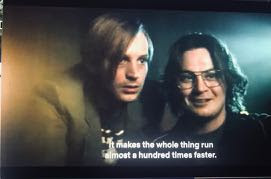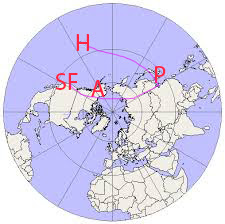The obvious first choices are Pyongyang and Washington DC. But that would require one to come to the other, to meet on the other's home turf. Let's back up and set some key criteria for determining the location?
Criterion 1 - they should meet on relatively neutral ground.
Criterion 2 - each should travel roughly the same distance
Criterion 3 - Security, both need to feel safe
These seem to be the biggies. I would guess only #3 is a deal breaker. If one side gives in on one criterion then they need to gain on another, or on what comes out of the talks. So Pyongyang and DC are not totally out of the question, but if Trump goes to North Korea, Kim would have to agree to close down his nuclear weapons. That would be my condition at least. If Kim came to DC, he'd have to at least to go to an NBA game. But security might be an issue like it was for
Kruschev when we was denied a visit to Disneyland in 1959.
So where else might they meet?
There's
Switzerland - a neutral country of sorts -
where Kim went to school.
Anchorage is almost half-way between Pyongyang and DC - a little closer to Korea, but part of the US. By mid to late May the leaves will be back on the trees. And there's a small but visible (South) Korean population.
Or out on a ship in the North Pacific in international waters? Whose ship?
FDR met Churchill on a ship of Newfoundland in August 1941. But that was a secret meeting - FDR told the press he was going on a short fishing trip. Churchill had to brave German u-boats to get there. Security was important, but it was a meeting of close allies. It was not a highly publicized meeting like this one will be.
Beijing would be happy to host, I'm sure. The US leans on China to deal with its neighbor. It could work, but then Xi would get some of the glory. Probably not.
And then there's Moscow. Putin could just tell Trump directly what he wanted him to do. And Russia borders North Korea too. And Trump could bask in Putin's macho image.
Seoul? They were the messenger to Trump about the invitation. But security and other issues would seem to be a big hurdle.
When President Johnson agreed to peace talks with the North Vietnamese, location took a while to settle:
Geneva, where the 1954 talks had been held that resulted in the division of Vietnam into North and South. Hanoi rejected this on the grounds that it had ‘unhappy memories’. It then suggested Phnom Penh. This was rejected by Washington. Instead, the US offered 5 other capitals in Southeast and South Asia, including New Delhi, which was favoured by Saigon. Hanoi rejected these options and proposed Warsaw, which the US also rejected. The US then countered by proposing 9 capitals all of which were again rejected. Ultimately, after weeks of bargaining, Paris was chosen as the site to hold preliminary talks (officially referred to as ‘official conversations’ to avoid being confused with ‘negotiations’).
Then came the question of who would be invited, and then there was the battle over the shape of the table:
These discussions, which began in November 1968, were centred on questions about the shape of the conference table, how many tables there should be, and how they would be placed. These discussions became known as the ‘battle of the tables’ and would last ten weeks until mid-January 1969 as fighting continued to rage and Richard Nixon won the presidential election. From the start, it was recognized that a triangular table (with the North Vietnamese/NLF combined but the US and South Vietnamese separate) would be a non-starter as it would imply that the Communist side was outnumbered two-to-one. [These two quotes came from Defense In Depth]
I can sympathize with Trump wanting to get past all these seemingly petty details of status and appearance, but it's March 11 now, and the proposed meeting is in May, so they don't have time to dawdle on such things. Can the
'Mentally deranged U.S. dotard' and the 'little rocket man' get over their past insults to resolve all these details that quickly?
And just for the record, let me put Mar-a-Lago on the list. It defies my criteria, but it wouldn't surprise me.
This Won't Be Nixon's Trip To China
I remember being in the car during the summer of 1971 a winding road along a river somewhere in Idaho, when we heard on the radio that Nixon was going to China. Perhaps Trump remembers that too and how Nixon got so much glory from that. But this is not the same. China was the most populous country in the world and through a rabid anti-communism combined with support for the nationalist Chinese who had had to flee to Taiwan, the US had spent years pretending that Taiwan was China and the mainland didn't really exist. Or at best was a temporarily runaway province of Taiwan. Nixon's move, preceded by months of negotiations by the adept if ethically-flawed Henry Kissinger, was really bringing the US to a reality its leaders had ignored for decades.
This meeting with Kim Jong Un is something entirely different. First, and foremost, it's a distraction from all the political hornets swarming around the White House. There's a certain part of me that agrees with Trump, that the State Department is often so full of itself*, it can't do things simply because, 'well, we just don't do that. We have to go by protocol.' But the career people at the State Department have done their homework and understand the implications of what they say and do. No matter how cautiously. Trump still thinks this is some simple business deal where he can sit down and work things out over a meal. He'll use his great ability to read people to decide what to do - and that won't happen until the middle of the meeting. (Of course, that's said with the l
ong list of people who have left their positions in the Trump administration in mind.)
*I'm biased here. Back in 1970, when I was slowly making my way home from Peace Corps Thailand, the package of materials that came with the news that I'd passed the Foreign Service written exam, caught up with me while I was visiting a friend in Uganda. I went to the embassy in Kampala to talk to someone about what life in the foreign service was like. He spent the whole time telling me about all the servants I would have and the protocol of calling cards and who comes and goes first at official parties. That, and the idea of having to officially defend the US military in Vietnam, led me to skip the next step in the process - the interview. I know that the State Department has changed over the years, but I do believe a bit of the upper crust proper way of doing things still persists.

 Netflix was pushing Squid Game and I reviewed the brief description and decided I could pass. It sounded too violent. But then I read a review about how it was Netflix's biggest hit ever. So we watched Episode One.
Netflix was pushing Squid Game and I reviewed the brief description and decided I could pass. It sounded too violent. But then I read a review about how it was Netflix's biggest hit ever. So we watched Episode One.  We decided to give it another try. What I've said above shouldn't spoil any of it for you. All that happened in the beginning of Episode One.
We decided to give it another try. What I've said above shouldn't spoil any of it for you. All that happened in the beginning of Episode One. 






